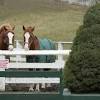The AP kept the name Gulf of Mexico; White House barred reporters ...

When President Donald Trump ordered the Gulf of Mexico renamed the Gulf of America, The Associated Press said it would keep the body of water’s previous name, a nod to its global user base and centuries of precedent. The decision had consequences Tuesday, when the White House barred the wire service from two events.
Trump included the Gulf of Mexico name switch in a Jan. 20 executive order that also called for a mountain peak in Alaska to revert from Mount Denali to Mount McKinley, in honor of President William McKinley, who served from 1897 until his 1901 assassination. (Trump has said he admires McKinley’s use of tariffs.) The AP reasoned that it would use Mount McKinley because the mountain “lies solely in the United States” and Trump had authority to change the name.
In its stylebook update, issued three days after the executive order, the AP advised its stylebook’s users to “Refer to (the gulf) by its original name while acknowledging the new name Trump has chosen.” In the entry explaining the decision, the AP said “The Gulf of Mexico has carried that name for more than 400 years.” An estimated 45.5 million users in 100 countries use the stylebook monthly.
In a statement Tuesday, AP Executive Editor Julie Pace wrote that the White House had said AP journalists would be barred from attending Trump’s executive order signing that day because it hadn’t adopted Trump’s preferred gulf name. The session went beyond the signing when Trump and entrepreneur Elon Musk, who heads the Department of Government Efficiency, opened the floor for press questions.
The AP’s David Bauder, a guest on a January episode of Poynter’s “The Poynter Report Podcast” wrote Wednesday that the White House had also barred a reporter from the wire service from a late-evening event in the White House Diplomatic Room. (In his Reliable Sources newsletter, CNN’s Brian Stelter said the event was the White House’s welcoming home of American teacher Marc Fogel, who had been detained in Russia.)
The Federal Aviation Administration and Google have been changing names in response to Trump’s order. The FAA on Monday issued a notice saying it was updating its data to show the Gulf of America and Mount McKinley names. The U.S. Geological Survey also made the gulf name switch, which Interior Secretary Doug Burgum, the former North Dakota governor, acknowledged Sunday on X.
“It’s official! Congratulations @POTUS on the Gulf of America!” Burgum wrote in his post, which had drawn 1.3 million views by Wednesday.
Google said Monday that U.S. users would see the Gulf of America on Google Maps; users in Mexico would keep seeing Gulf of Mexico.
Trump, who had declared Sunday “Gulf of America Day,” acknowledged the Google Maps change in a Monday Truth Social post that had drawn 28,000 likes as of Wednesday.
Pace, meanwhile, wrote in her statement, “It is alarming that the Trump administration would punish AP for its independent journalism. Limiting our access to the Oval Office based on the content of AP’s speech not only severely impedes the public’s access to independent news, it plainly violates the First Amendment.”
Responding to the White House’s decision, The White House Correspondents Association issued a statement by its president, Eugene Daniels, on Tuesday that said barring the AP’s reporter from “an official event open to news coverage … (was) unacceptable.” (Daniels is chief correspondent for Politico’s daily Playbook newsletter.)
The statement also said, “The White House cannot dictate how news organizations report the news, nor should it penalize working journalists because it is unhappy with their editors’ decisions.”
National Press Club President Mike Balsamo also criticized the White House’s move, calling it “a direct attack on press freedom.”
“No administration gets to decide how journalists do their jobs,” Balsamo, who is the AP’s law enforcement editor, wrote in a Tuesday statement that asked the White House to reverse course. “Barring a journalist from an official event because their newsroom refuses to conform to government-imposed language is more than an attack on one reporter or outlet — it is an assault on the First Amendment and the public’s right to know.”
NPR noted that Tuesday’s move came after the Pentagon closed workstations for eight news organizations, including NPR, The Washington Post and The New York Times. Conservative outlets including Newsmax and One American News Network took the spots.
In a Wednesday press briefing at the White House, CNN’s Kaitlan Collins asked Press Secretary Karoline Leavitt about the decision to bar the AP reporter.
“The question here is, is this setting a precedent that this White House will retaliate against reporters who don’t use the language that you guys believe reporters should use?” Collins asked. “And how does that align with the First Amendment commitment that you were just talking about?”
Leavitt said, “I was very upfront in my briefing on Day 1 that if we feel that there are lies being pushed by outlets in this room, we are going to hold those lies accountable.”
“And it is a fact that the body of water off the coast of Louisiana is called the Gulf of America,” she said. “And I’m not sure why news outlets don’t want to call it that but that is what it is.”


 Canada
Canada Argentina
Argentina  Australia
Australia  Austria
Austria  Brazil
Brazil  Chile
Chile  Czechia
Czechia  France
France  Germany
Germany  Greece
Greece  Italy
Italy  Mexico
Mexico  New Zealand
New Zealand  Nigeria
Nigeria  Norway
Norway  Poland
Poland  Portugal
Portugal  Sweden
Sweden  Switzerland
Switzerland  United Kingdom
United Kingdom  United States
United States 






































